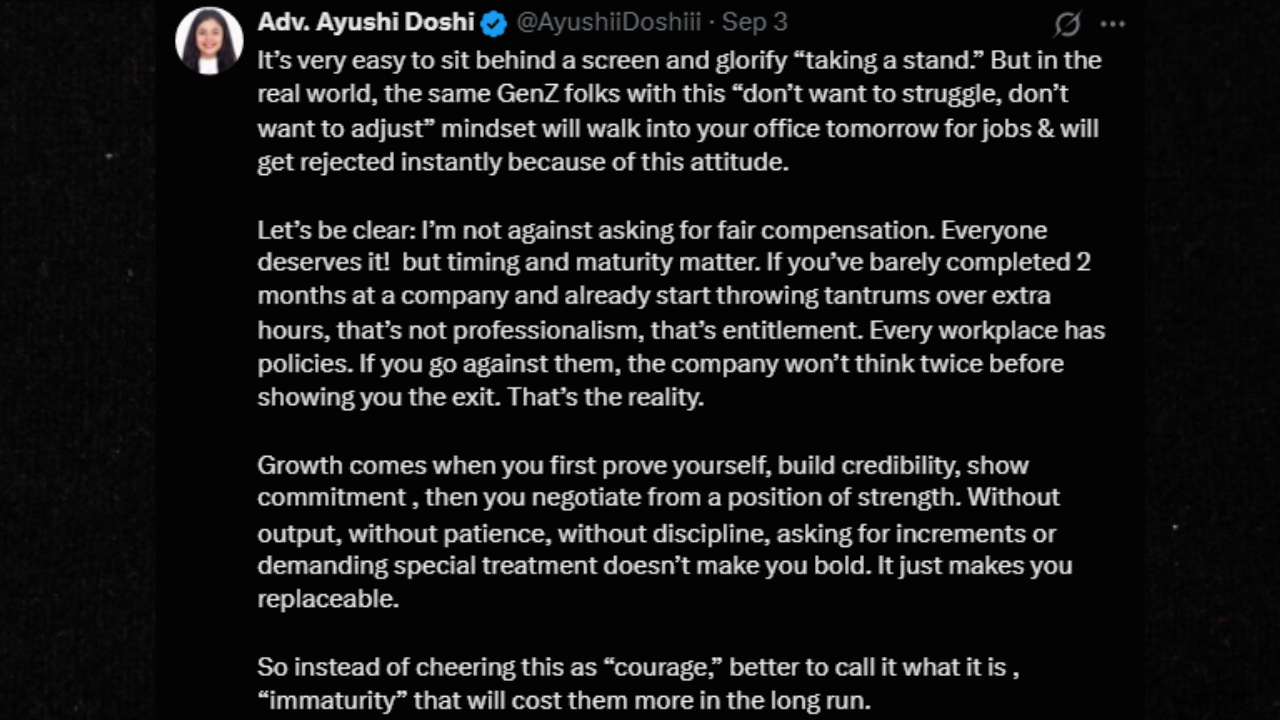Ethics & Policy
Scarlett Johansson, Jonathan Bailey’s Jurassic World Rebirth: Is The Jurassic Park Franchise, Above All, A Study In Human Hubris?

Jurassic World Rebirth: Is The Jurassic Park Franchise, Above All, A Study In Human Hubris?
It was 1993, and I still remember the first time I stepped into a movie theatre, my small hand wrapped tightly in my father’s—a rare and special outing. The film was Steven Spielberg’s Jurassic Park, and from the moment the screen lit up, I was spellbound. Spielberg didn’t just bring dinosaurs to life; he resurrected a sense of wonder. With a masterful blend of awe, imagination, and fear, he transported us to a world where the prehistoric past wasn’t just history—it was suddenly, thrillingly, real. Over the years, each of the films in the franchise, irrespective of their box office has remained personal favourites.
Now, as anticipation builds for the latest in the franchise – Jurassic World Rebirth, one cannot help but revisit the legacy of a cinematic universe that began over three decades ago. And while Rebirth promises to introduce a fresh cast in Scarlett Johansson and Jonathan Bailey, along with new evolutionary twists to the prehistoric chaos, at its core, the film is perhaps yet another chapter in a cautionary tale about human ambition, the illusion of control, the act of playing God and ultimately, the enduring theme of hubris.

Ever since its inception with the 1993 classic Jurassic Park, the franchise has always been more than just a ground-breaking showcase of visual effects and dinosaur thrill. Based on Michael Chrichton’s novel of the same name, Jurassic Park struck a chord because amidst all its visual spectacle, it questioned the ethics of scientific overreach and moral dilemma. In its introduction of John Hammond, the billionaire whose dream of resurrecting the prehistoric creatures through genetic engineering, it paved the path of showcasing what happens when Man plays God.
The now-iconic line, “Your scientists were so preoccupied with whether they could, they didn’t stop to think if they should,” uttered by Dr. Ian Malcolm, serves as the franchise’s moral compass—one that every subsequent film has circled back to.
With the 1997 The Lost World: Jurassic Park, Spielberg continued the narrative, taking the audience to Isla Sorna, a second island where dinosaurs roamed free without human interference. However, human greed prevailed —this time in the form of corporate exploitation, as InGen attempted to bring dinosaurs to the mainland to score a profit. What followed was an inevitable carnage that underscored the impossibility of domesticating nature.

Similarly, Joe Johnston’s Jurassic Park III, which released in 2001, and is often considered to be the weakest in the series, Dr Alan Grant was tricked into returning to Isl Sorna, becoming, in the process, witness to the folly of human arrogance once more. The film underscored the message that the past is not a petting zoo, and prehistoric creatures, once unleashed, cannot be conveniently contained.
In 2015, after a 14-year-hiatus, Jurassic World rebooted the franchise for a new generation, while also introducing Chris Pratt to the franchise. The original theme park dream had finally been realized and Jurassic World was a fully functioning tourist destination. However, both the world and the dinosaurs ad changed. And in a bid to wow increasingly desensitised audiences (a meta-commentary on blockbuster culture itself), scientists created the Indominus rex, a genetically engineered hybrid designed for maximum spectacle. However, as luck would have had, the monster broke free, triggering chaos that was all too familiar yet chillingly relevant. The film, very craftily reframed hubris not just as scientific overreach but rather as capitalist excess – tampering with nature to meet consumer demand.
2018’s Jurassic World Fallen Kingdom doubled down on the consequence. When a volcanic eruption threatens Isla Nublar, a rescue mission became a smokescreen for corporate malfeasance. Dinosaurs were auctioned off as weapons and luxury pets, and genetic manipulation reached disturbing new heights with the introduction of the Indoraptor.
The film, interestingly, also included a twist in the cloned human child, Maisie Lockwood, who became central to the story, blurring the line between science fiction and ethical dilemma. As dinosaurs escaped into the human world by the film’s conclusion, the franchise moved into uncharted territory — a world where humans must learn to coexist with dinosaurs.
Jurassic World Dominion (2022) brought back legacy characters like Ellie Sattler, Alan Grant, and Ian Malcolm to confront the next wave of ecological imbalance. The film introduced genetically modified locusts, linking the franchise’s themes of bioengineering to real-world agricultural fears. Dominion reiterated the franchise’s central warning: meddling with nature—whether through cloning, commodification, or control—inevitably leads to unintended consequences.
Now, as Jurassic World: Rebirth prepares to usher in a new era, questions abound. Will the franchise pivot toward a darker, more introspective tone, or lean into its blockbuster legacy? Early hints suggest that the story may tackle themes of accelerated evolution and unnatural selection, potentially pushing the franchise into speculative sci-fi territory.
The Jurassic saga has, over seven films, evolved from a man-versus-nature thriller to a meditation on ethics, technology, and ecological balance. What commenced as a simple premise – resurrecting dinosaurs – has metamorphosed into a sprawling narrative about the dangers of unchecked ambition and the illusion of control. Each film, in its own way, asks a chilling question: what happens when humanity refuses to learn from its mistakes?
As Jurassic World: Rebirth looms on the horizon, one cannot help but reflect that the message remains constant—when humans play god, nature doesn’t just fight back, it rewrites the rule book.
Ethics & Policy
Ugandan Editors Tackle AI Regulation, Ethics, and Journalism Integrity at WAN-IFRA Workshop

Artificial intelligence (AI) regulation, ethics, and newsroom integration took center stage at a workshop held on Aug. 20, 2025, organized by the Uganda Editors Guild in collaboration with the World Association of News Publishers (WAN-IFRA). The session brought together editors and media professionals to discuss how newsrooms can responsibly adopt AI tools while addressing legal, policy, and ethical challenges.
Legal and Policy Landscape
The Collaboration on International ICT Policy for East and Southern Africa (CIPESA) highlighted the lack of AI-specific legislation in Uganda but pointed to several existing laws that indirectly govern AI use. Key among these is the Uganda Data Protection and Privacy Act of 2019, which regulates personal data processing and includes provisions on automated decision-making under Section 27.
Other legal instruments discussed included:
- Copyright and Neighboring Rights Act — Protects intellectual property and authors’ rights.
- National Payment Systems Act — Grants the central bank oversight over payment systems.
- National Information Technology Authority Uganda (NITA-U) Act — Establishes NITA-U to enhance public service delivery and drive digital transformation.
- Uganda Communications Act (2013) — Establishes the Uganda Communications Commission, responsible for regulating AI use within the communications sector.
- Regulation of Interception of Communications Act (2010) — Requires telecom providers to install AI-enabled systems for lawful interception of communications.
- Anti-Terrorism Act and Computer Misuse Act — Provide frameworks for security, cybersecurity, and AI-assisted monitoring of digital threats.
National Strategies and AI Integration
The workshop also reviewed Uganda’s broader digital policy frameworks:
- Vision 2040 — Aims to transform Uganda into a middle-income economy by 2040.
- National Fourth Industrial Revolution (4IR) Strategy (2020) — Positions Uganda as a continental hub for emerging technologies.
- Third National Development Plan (NDP III) — Outlines development priorities, including AI and machine learning integration into national projects.
These strategies underscore Uganda’s recognition of AI as a driver of economic growth, though implementation remains fragmented without a dedicated regulatory framework.
AI in Newsrooms: Opportunities and Risks
CIPESA’s Programmes Manager-Legal, Edrine Wanyama, cited findings from the Artificial Intelligence in Eastern Africa Newsrooms report, noting that AI can enhance newsroom productivity through faster reporting, automated fact-checking, and improved detection of misinformation.
However, the workshop also highlighted several risks:
- Spread of disinformation and misinformation
- Reduced accuracy due to speed-driven reporting
- Over-reliance on AI at the cost of creativity
- Erosion of journalistic ethics and integrity
- Potential job losses among journalists and editors
Ethics and Transparency
Dr. Peter G. Mwesige, Chief of Party at CIPESA, urged editors to cover AI critically rather than focusing only on its capabilities. He emphasized the need for explanatory, evidence-based reporting and called for transparency when using AI in editorial tasks.
“AI can assist with brainstorming, editing, and transcription, but journalists must still put in the hard work,” Mwesige said.
Recommendations for Responsible AI Use
CIPESA concluded the workshop by presenting key recommendations for integrating AI ethically and effectively in newsrooms:
- Align with international standards like the Paris Charter on AI.
- Respect copyright and intellectual property rights.
- Develop internal newsroom policies for AI adoption.
- Collaborate across media houses to create best practices.
- Invest in journalist training on ethical AI usage.
- Strengthen fact-checking systems to combat misinformation and deepfakes.
- Prioritize human oversight when deploying AI-driven tools.
The workshop underscored the urgent need for Uganda to balance AI-driven innovation with data protection, ethical journalism, and regulatory safeguards to ensure responsible adoption within the media industry.
Ethics & Policy
Woman Rants About Gen Z Employee Walking Out After Not Getting Paid For Extra Hours– X Post Backfires- Viral Workplace Toxicity | Viral

Woman’s post on Gen Z goes viral. Image Source: AI generated image
It seems like Gen Z employees- all around the country- have earned a reputation of being rather ‘unadjustable’. Social media is full of older generation employees ranting about Gen Zs and their work ethics. Adding another incident to the list, a woman recently shared a rant on the internet, where she expressed her disappointment over a young employee walking out– after the company refused to pay him for ‘additional hours’. As per the post, the employee was new and began to demand additional pay after working for two months or so. As soon as the post on the same was shared online, it went viral; however, it ended up backfiring! Most netizens sided with the employee and lauded his attempt to ask for ‘fair pay’. As per the post, the woman also spoke on how new employees should be willing to ‘struggle’ and learn to have more patience.
Times Now could not confirm the details and the authenticity of the post.
Check out the viral post:
“Met a GenZ guy recently who had just landed a job at a tier 1 company. Within no time, he started demanding extra pay for every additional hour, and when he didn’t get it, he walked out. This is the mindset now! No willingness to struggle, no commitment to putting in the hours, no patience to prove themselves. Just quick money, quick increments, and zero accountability. The work ethic gap between generations is becoming too real,” the post read.
“It’s very easy to sit behind a screen and glorify “taking a stand.” But in the real world, the same GenZ folks with this “don’t want to struggle, don’t want to adjust” mindset will walk into your office tomorrow for jobs & will get rejected instantly because of this attitude. Let’s be clear: I’m not against asking for fair compensation. Everyone deserves it! but timing and maturity matter. If you’ve barely completed 2 months at a company and already start throwing tantrums over extra hours, that’s not professionalism, that’s entitlement. Every workplace has policies. If you go against them, the company won’t think twice before showing you the exit. That’s the reality,” the post further read.
“Growth comes when you first prove yourself, build credibility, show commitment , then you negotiate from a position of strength. Without output, without patience, without discipline, asking for increments or demanding special treatment doesn’t make you bold. It just makes you replaceable. So instead of cheering this as ‘courage,’ better to call it what it is , ‘immaturity’ that will cost them more in the long run,” the post concluded.
The post was shared on X (formerly Twitter), by the handle ‘AyushiiDoshiii’. The post was shared yesterday and pulled more than 172K views from people.


Here’s how social media reacted:
“They know that they are not going to get anything even after the struggle and commitment, as most who are sitting above are basically exploiters. This is from where the mindset is coming,” a user said.
“No willingness to struggle??? Struggle unfairly? Why? It’s not worth it. If a company is unfairly treating you, why treat it fairly, this is not the era of slavery,” added a second person in the comment section.
“Finally, someone is trying to bring first world work culture to India where its own citizens are exploited and paid peanuts and then the companies boast about it,” added another person. “He was right,” said another.
Ethics & Policy
Kemkomdigi Mechanism Evaluation To Ensure AI Grows According To Ethics

JAKARTA – The Ministry of Communication and Digital Affairs (Kemkomdigi) has begun to strengthen the governance of national artificial intelligence (AI) by preparing a special evaluation mechanism. The goal is that every innovation in the AI sector continues to run in accordance with the principles of ethics and social responsibility.
The evaluation mechanism is contained in the draft Guidelines for Artificial Intelligence (KA) Ethics, which allows incident reporting as well as encourages self-assessment from AI developers.
“Gradually, the evaluation of the application of ethical guidelines will continue to ensure ethical and responsible train ethics governance,” said Director of Artificial Intelligence and New Technology Ecosystem of the Ministry of Communication and Industry, Aju Widya Sari, as quoted by ANTARA.
In addition to ethical guidelines, the government is also preparing the White Book of the National AI Roadmap which is designed to go hand in hand with the preparation of these guidelines.
According to Aju, this step is important so that AI development in Indonesia is in line with the development of AI ethics at the global level, as well as strengthening collaboration between stakeholders.
In the draft guidelines, ethical aspects are emphasized as an important basis because the development and utilization of AI can have a direct impact on basic human rights.
The principles raised include inclusiveness, humanity, security, accessibility, transparency, credibility, accountability, personal data protection, environmental sustainability, and intellectual property protection.
The application of AI ethics is believed to provide three main benefits, namely economic sustainability, social and environmental. From an economic perspective, AI has the potential to create innovations while at the same time encouraging growth. For social, ethical AI can expand access to public services to be more equal. As for the environment, this technology can help optimize the use of resources so that it is more efficient and sustainable.
The English, Chinese, Japanese, Arabic, and French versions are automatically generated by the AI. So there may still be inaccuracies in translating, please always see Indonesian as our main language.
(system supported by DigitalSiber.id)
-

 Business1 week ago
Business1 week agoThe Guardian view on Trump and the Fed: independence is no substitute for accountability | Editorial
-
Tools & Platforms3 weeks ago
Building Trust in Military AI Starts with Opening the Black Box – War on the Rocks
-

 Ethics & Policy1 month ago
Ethics & Policy1 month agoSDAIA Supports Saudi Arabia’s Leadership in Shaping Global AI Ethics, Policy, and Research – وكالة الأنباء السعودية
-

 Events & Conferences4 months ago
Events & Conferences4 months agoJourney to 1000 models: Scaling Instagram’s recommendation system
-

 Jobs & Careers2 months ago
Jobs & Careers2 months agoMumbai-based Perplexity Alternative Has 60k+ Users Without Funding
-

 Education2 months ago
Education2 months agoVEX Robotics launches AI-powered classroom robotics system
-

 Funding & Business2 months ago
Funding & Business2 months agoKayak and Expedia race to build AI travel agents that turn social posts into itineraries
-

 Podcasts & Talks2 months ago
Podcasts & Talks2 months agoHappy 4th of July! 🎆 Made with Veo 3 in Gemini
-

 Podcasts & Talks2 months ago
Podcasts & Talks2 months agoOpenAI 🤝 @teamganassi
-

 Education2 months ago
Education2 months agoMacron says UK and France have duty to tackle illegal migration ‘with humanity, solidarity and firmness’ – UK politics live | Politics





















